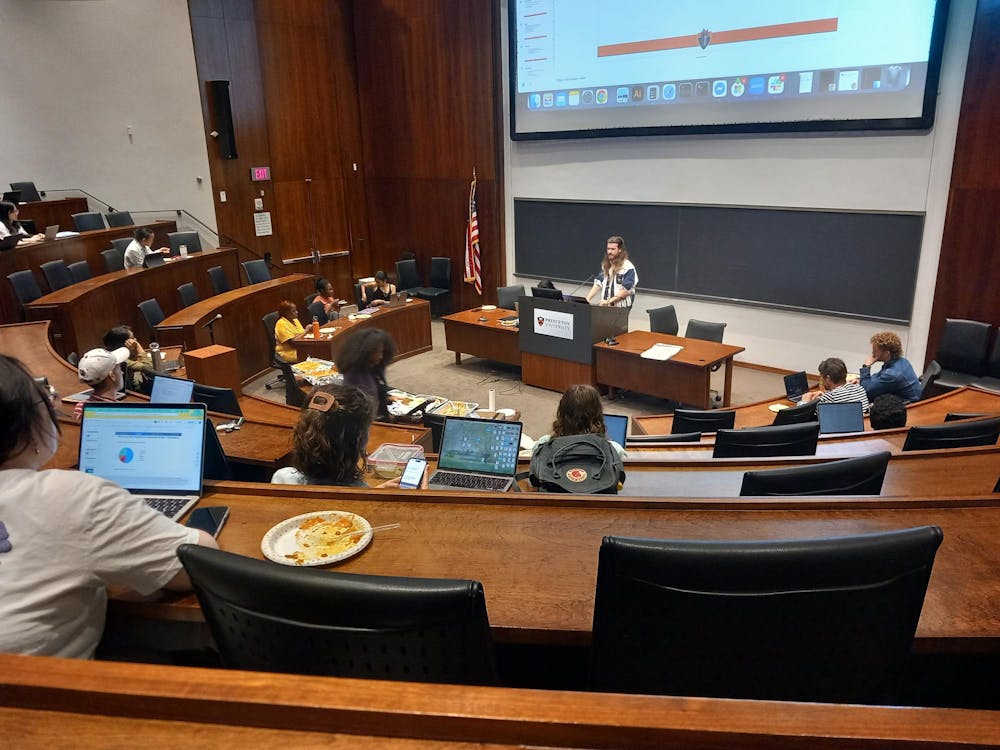At the Graduate Student Government (GSG) Assembly meeting on April 29, discussion focused on Council of the Princeton University Community (CPUC) nominees; Dissertation Completion Enrollment (DCE) status; and continued initiatives to benefit graduate students, including the continuation of the expanded Procter Hall meal plan pilot, more support for students with children, and planning the graduate student center.
At the start of the meeting, members of the assembly were informed of procedural errors in past voting on CPUC nominees. Vice President for Internal Affairs Jan Ertl noted that, according to the GSG constitution and bylaws, CPUC representatives must be elected by the assembly itself. “In the past, I think three or four years, it’s been a general vote along with the GSG elections,” Ertl said. “But that’s actually been sort of incorrect.”
Regarding the current election, Ertl clarified that a Google form will be sent to assembly members via email and they must send their votes in by Wednesday. In contrast, U-Councilors, the undergraduate counterparts on the CPUC, are voted in by the entire undergraduate class rather than by assembly.
Among the CPUC committees’ nominees, Daniel Levy, who is running for the Rights and Rules Committee, was the only nominee present to give a statement.
The CPUC is still seeking additional graduate student nominees for several key committees: one each for the Rights and Rules Committee, the Priorities Committee, and the Ad Hoc Committee on Sexual Climate, Culture, and Conduct. The Committee on Naming remains without any nominee.
Graduate student positions on CPUC committees can influence funding and resource allocations to the graduate school, as well as determine rules and procedures that graduate students must follow as members of the University.
Hunter York, academic affairs officer, then proposed changes to the DCE status for graduate students. DCE status currently applies to Ph.D. students in their sixth or seventh year who have not yet completed their dissertation.
“There are a variety of confusing and restrictive rules that apply once you enter DCE status,” York said. “For example, you’re no longer allowed to take classes. And if you become pregnant, you can’t pause your academic clock — you’re expected to continue as usual,” he explained. This means pregnant DCE students are not eligible for the additional time off typically granted to other graduate students.
York contrasted the DCE policy with those of peer universities without the same designation and asked meeting members to take a survey on DCE to get baseline opinions for a future proposal.
York clarified that his proposal intends to maintain restrictions on classes for DCE students but instead focuses on “changing the healthcare policy” to make it more generous.
In a discussion on academic climate surveys, Ertl outlined potential improvements to leave of absence policies. He proposed allowing students on a local leave of absence to remain in graduate housing for a semester — a shift from the current rules. “If you go on leave of absence, your housing is terminated within 10 days or, with approval from the Graduate School, up to 60 days,” he said. “There’s currently no way [to stay in graduate student housing if] you need to have a surgery.”
He also announced that, on Thursday, GSG will be meeting with the Associate Provost to discuss its graduate student center proposal. Ertl said that they are still considering moving this center to what was the McCosh Health Center but that there is a lot of campus "reshuffling" at the moment.

“We will find some suitable space for grad students,” he said.
Ertl said that Thursday’s meeting will also address sustainability initiatives, New Jersey transportation subsidies, and retirement savings for graduate students.
Meghana Veldhuis is a senior News writer for the ‘Prince.’ She is from Bergen County, N.J., and typically covers graduate students, postdocs, faculty, and campus unions and labor.
Please send any corrections to corrections[at]dailyprincetonian.com.








